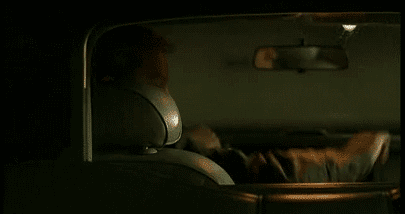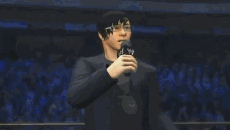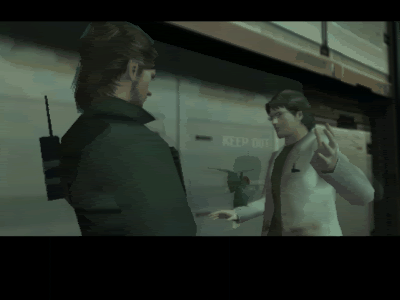Okay, so. You just witnessed the ending of Metal Gear Solid 2: Sons of Liberty for the first time in your life. What a ride, huh? But I bet you're telling yourself the exact same things that
Literally Everyone Who Beat MGS2 Back In 2001 told themselves: "The story is garbage, I mean, it's like he (Kojima) was just making shit up for the sake of being confusing!"
Not a single person liked MGS2's story or narrative when the game first came out, except for contrarians like Jeff who just liked to see the series go completely off the rails. It would be foolish to expect anyone who's just seeing the ending of MGS2 for the first time to immediately appreciate the game, because
nobody did. It took
years.
We don't have years. I want you to understand the method to the madness in MGS2 as soon as possible. I will try to explain, as best as I can. First, though, I'm going to make sure everybody who hasn't wasted several years of their lives and countless thousands of dollars on a useless English Lit degree is up to speed. If you feel you have a grasp on the subjects of the next couple of paragraphs, feel free to skip ahead a bit.
Let's talk about the distinction between a Plot and a Narrative. A plot (or, for our purposes, a 'story') is defined as the events that take place throughout a work of fiction. If I say something, like, "Raiden defeats Solidus, and shortly afterward he realizes that he had been wearing Dog Tags with the player's name engraved on them. Raiden throws them away," that is one of the events that occurs within MGS2's plot. A narrative is a bit harder to explain, but basically: a narrative is the method that the author (in this case, Kojima) uses to sequence, convey and contextualize those plot elements. In the case of the above example, we would start talking about the "narrative functions" of that dog tag sequence: why does it exist within the text? What are the author's likely goals for doing so? What is he trying to tell us? Does he do it successfully?" The answers to these questions, cumulatively and applied to every plot element in the game, account for the narrative.
A function of narrative is that of subtext, and that's the second thing I want to define before we dive in. Subtext is a pretty simple concept, and can be defined as "An underlying message or meaning expressed implicitly in a narrative, as opposed to explicitly. It is never directly stated, and the intent is for the reader (or, in this case, player) to suss it out on their own." The primary agent of subtext is metaphor: you interpret one plot element as a metaphor for something else entirely, and suddenly you have an entire subtext formed out of the relations and connections you can make back to that metaphor.
Back to Metal Gear Solid 2 (if you skipped ahead of the last few paragraphs, here's where you jump back in,) what I hope to express today is an idea that is gaining more and more traction as more people try to make sense of MGS2. The idea is, simply, that Metal Gear Solid 2 is a work that is defined almost exclusively by its subtext. Every plot element that explicitly occurs within the game is little more than an elaborate and arbitrary metaphor designed specifically to bolster the game's subtext.
Let's keep talking about those dog tags. They're one of the key pieces of information. They bear the name that the player entered at the first node in the Plant chapter. Most players will have put in their real name. The narrative function of those dog tags, then, is to create a relationship (perhaps better defined as a link) between the player and Raiden.
Why is Kojima creating this link? Well, think about it. Raiden is a character who has spent a whole bunch of times playing through VR simulations of Shadow Moses, the bundle of VR missions that shipped in MGS: Integral, simulations of the events of Metal Gear 1 and 2. He is seriously invested in the idea of Solid Snake-- who, for all of Raiden's intents and purposes, was little more than an avatar that he inherited while going through those VR simulations-- as a legendary hero, the figure to which Raiden should aspire. Sound like anyone you know?
Everybody who played Metal Gear Solid 1 is, in some sense, Raiden. Or rather, Raiden is a manifestation of those people. This is the key subtext, but it's not one that Kojima shied away from making clear. Every time MGS2 makes explicit reference to the fact that it is a video game, it does so to make this point as clear as it can without stating it outright. The AI Freakout has a ton of good ones, as the Colonel starts mixing up his briefings and relays messages that were contained in every past Metal Gear game. "Variety Level 13- The Return of Genola" is one of MGS1's VR missions. He tells you to use a PSG-1 to save Meryl. He takes on the role of Big Boss to brief you on the mission objectives of the first Metal Gear (MSX) game. He starts quoting Mei Ling's proverbs. These quotes are all taken directly from their respective games, because the video games that we've played and the VR missions that Raiden has done are one and the same. As the virus starts to scramble GW's logic, the cracks begin to show.
But it isn't limited to the AI Freakout, either. Several instances of the Colonel's speech throughout the rest of the Plant chapter are directly sourced to MGS1 as well. His explanation of the Soliton Radar at the start, for instance, is a word-for-word recreation of the MGS1 explanation. In plot terms, this is because the Colonel is the GW AI's implementation of the S3 Plan-- he is selectively preserving and relaying past information in order to shape the course of Raiden's individual growth. The broader S3 Plan will do this for the entire human population. In narrative terms, however, it's because Kojima wants to use these past games (and our experiences playing them) as an example for the points he is trying to make in MGS2.
A history lesson: After the release of every single Metal Gear Solid game, Hideo Kojima has gone on the record to state that it will be his final Metal Gear Solid game. He said this after MGS1's release. As such, we can assume that Metal Gear Solid 2 is the first video game that Hideo Kojima publicly stated he did not want to make. He made it anyway-- presumably strong-armed into it by his bosses at Konami, who wanted him to keep churning out the hits and bringing them the bucks.
Hideo Kojima needed to make a sequel to his dumb homage to Hollywood action movies and he didn't want to. He wanted to make something new. So he decided to make the most expensive "art game" that anyone has ever made, and ship it to us under the guise of it being a sequel to the hit video game, "Metal Gear Solid."
Subtextually, Metal Gear Solid 2 is a video game that is about Metal Gear Solid 1. It's about the people who played Metal Gear Solid 1. It's about the man who made Metal Gear Solid 1. It's about the success of Metal Gear Solid 1 and the sequel it supposedly necessitated. It's a bitter game, seeming to say "Here, you wanted a sequel to MGS? Well fucking here you go. Hope you enjoy it, fuckers." It's a weirdly paradoxical game: it oozes with the sense that Kojima didn't want to make it, but it's operating on so high a level that it seems impossible that he was not, at the very least, inspired to make it just so he could say these things. He wanted desperately to make a game that subtly suggested how little he actually wanted to make that game.
Everything in the Plant chapter is some veiled allusion to something that happened in Metal Gear Solid (which, itself, was full of elements taken part-and-parcel from Metal Gear 2-- it's hard to fault Kojima for not wanting to make the same game every generation). Ocelot explains this much while explaining the idea of the Solid Snake Simulation (which, as it turns out in plot terms, isn't a real thing-- but the parameters of this final test for the Selection for Societal Sanity are still to recreate Shadow Moses and try to shape Raiden into Snake). Our player character has the same relationship with MGS1 that we do. Raiden's journey to the end of this game and our own are, effectively, the same thing. The Colonel declares the operation as a success near the game's end, as Raiden has done everything they told him to.
Was it a success, though? All throughout the games are small, subtle touches to illustrate the differences between MGS1 and MGS2. Why does Vamp keep coming back to life? Because no boss in MGS1 comes back to life- you kill them and they stay dead. Vamp exists to challenge that convention, and to prevent us from enjoying MGS2 in the exact same ways we did MGS1. Liquid comes back for the same reason-- his inclusion alone practically invalidates what we did in MGS1. Little things with Olga/Ninja: She jumps in to try and chop off Ocelot's arm, as in MGS1, but he backs away to stop it from happening. She jumps in under RAY's foot, recalling Gray Fox's death-by-stomping in MGS1, but RAY backs off at the last second. Why do you need to get your radar map from a node in each strut? Because you didn't in MGS1. Why does the "boss fight" against Fortune exist? To make you feel powerless against a boss in a way that MGS1 did not-- you never so much as lay a finger on one of the game's marquee bosses.
For all the purported "success" of this simulation, there sure are a lot of cracks showing. This is where that plot-narrative divide comes back in. In plot terms, the Patriots' AI is happy with how this exercise went. In narrative terms, these cracks exist to make us question our own experiences with both MGS1 and MGS2. "It's like that game I love, but... different." It makes us question how badly we wanted a direct sequel to MGS1 in the first place. It puts us on the same page as Kojima, who didn't want to make a direct sequel to MGS1 in the first place. And, in the end, Raiden rejects his 'past life,' by throwing away your dog tags. He decides for himself that he won't allow himself to become too indulgent in past glories. He's done trying to be Snake, and in doing so, he has become his own character, his own person-- he is no longer merely a stand-in for the player's own experience. In the course of one video game, Hideo Kojima makes a game that everybody wanted to play, makes them realize that they didn't actually want to play that game, and then pulls the curtain back to reveal that he'd actually used MGS2 as a vehicle to make a completely different type of game all along.
But none of this is conveyed in words. It's all subtext. And when you're conveying subtextual ideas that are this crazy and convoluted, it should come as no surprise that the actual text-- the plot events, basically, are even moreso. If you focus on Metal Gear Solid 2 as a plot to be taken literally, you will find
nothing of value. Everything in this game is a cipher for some hidden, coded meaning. If you let yourself get hung up on "who's working with who?" or thinking seriously about the logistical nightmare of the game's plot events, you are on the same page that everybody was on back in 2001, when we all hated the game's story and thought it was just dumb convoluted bullshit. None of the lingering questions at the end of MGS2 (why won't Vamp die? How did Fortune deflect those missiles? How have the Patriots been dead for over one hundred years? How did Snake end up beside Raiden after diving after RAY? How much of Rose was real, and how much was the AI? How is Liquid possessing Ocelot through an arm?) were meant to have answers. The questions were never meant to be taken seriously as plot elements. They exist exclusively to challenge the notion that this game is just a retread of Metal Gear Solid 1. They exist to make you question your own appreciation of MGS1. They exist to shake things up, to confuse you, to make you think.
Considering the lengths to which MGS2 goes to idolize and make Snake a shining golden god of humanity, it's kind of funny that nobody really paid any attention to the things he had to say at the end of the game all that closely until much, much later.
"Listen, don't obsess over words so much. Find the meaning behind the words, then decide."
If Raiden is the player, then Snake is Kojima (he stated in an interview once that he has this same line of thinking-- he views Snake as some facet of himself through which he conveys ideas, thoughts and feelings to the player.) Collectively, we as an audience spent several years obsessing over the words. It was fitting that Raiden throws our dog tags away, because we certainly weren't "getting it" in the way he was. Snakejima was telling it to us directly from day one, but we weren't listening.
Metal Gear Solid 2 is a game about the passage of information from one generation to the next. Everything in the game suggests that on some level, the Patriots were right-- we do need to be more selective about what sort of information we pass on. If we focus too closely on recreating every element of past information, we end up in a nightmarish alternate universe where Metal Gear Solid 2 is just a plain old retread of Metal Gear Solid 1, with nothing new or interesting to say. That responsibility, of selectively choosing what sort of thoughts or ideas we're going to express to new generations, falls upon each of us as individuals, but on some level, Kojima hoped to influence you with this game, to show you the sorts of crazy and cool and amazing stuff you can do when you're more focused on selectively manipulating the knowledge you are passing on (as he does throughout MGS2 by playing with our expectations for what a sequel to MGS1 should be) than you are on just blindly retreading old ground.
How well did this message go down with the gaming public at large? Well, isn't it awful telling that it only took seven years for Metal Gear Solid 4 to come out and completely ruin everything this game had to say? To answer its unanswerable questions? To be the direct sequel to a game that was never supposed to have a sequel? To be the direct sequel to a game that specifically meant to tell us how intellectually-void direct sequels are?
To this day, it remains fitting that Raiden throws away the dog tags at the end. We weren't ready. We still aren't ready. We, as a public, will never be ready. So, from now on, we'll just get dumb for the sake of dumb. Because, that's all MGS2 ever was in the first place, right?
further reading/viewing:
http://www.deltaheadtranslation.com/MGS2/
https://www.youtube.com/watch?v=T-2YuPGYabw
https://www.youtube.com/watch?v=Zx2dgVKYWWU (minor spoilers for future games)
http://archives.insertcredit.com/features/dreaming2/index.html








